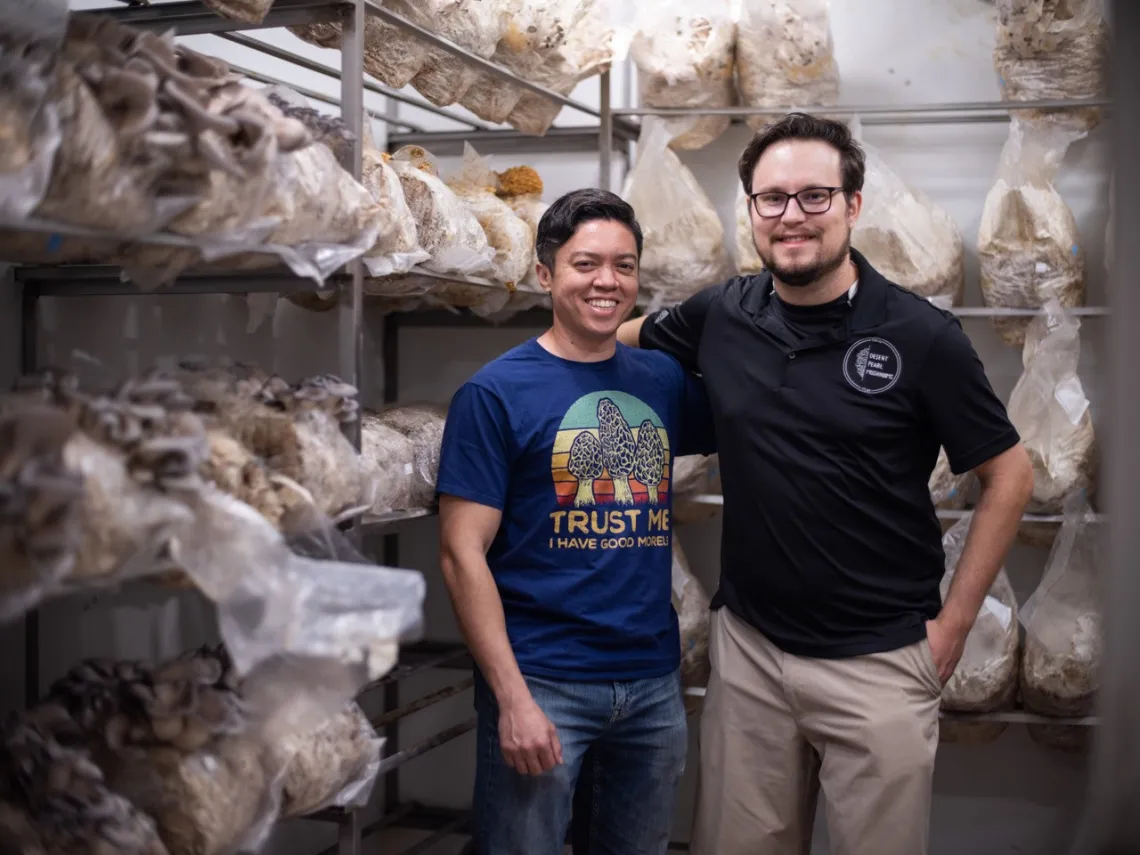CBC Alumni Spotlight: John De Lorenzo, Chemistry, Class of 2016

John De Lorenzo & Kris Savage of Desert Pearl Mushrooms
Photo by Taylor Noel Photography
CBC alumnus John De Lorenzo earned his degree in Chemistry from the College of Science in 2016. Along with business partner, Kristopher Savage, a graduate from the College of Engineering class of 2014, as well as a few other friends from the University of Arizona, the group ventured into specialty mushroom production and urban farming. Together, they’ve introduced fresh specialty mushrooms through their business to countless health enthusiasts and foodies through Community Food Bank and Heirloom Farmers Markets, in addition to working with adventurous chefs and other local producers in and around Tucson. They’ve even gotten into the good graces of incredible distributors like Pivot Produce, Gallery of Food, Tucson Community Supported Agriculture (Tucson CSA), Time Market, Five Points Market & Restaurant, and other fine local grocers around town. During the pandemic of 2020, they took a leap from their modest suburban digs and moved into a shared industrial warehouse space near downtown Tucson along the I-10 freeway.
Desert Pearl Mushrooms is a specialty culinary and medicinal mushroom producer and vertical indoor farm dedicated to low-water sustainable agriculture in the Sonoran Desert. It was started in 2018 by UArizona alumni with degrees in Chemistry, Plant Sciences, Controlled Environmental Agriculture, and Engineering Management. The farm has evolved over the years from its humble beginnings as an aquaponics project in one of the other founders’ backyards, turning into one of Tucson’s niche urban farms. They rotate through over 30 kinds of specialty mushrooms annually, growing many varieties of Oyster mushrooms and Lion’s Mane, as well as other popular species like Shiitake, Maitake, Cordyceps, Reishi, and Turkey Tail among others. You may have encountered their produce since the farm services many restaurants and farmers markets in the greater Tucson area, and their mushrooms and mushroom supplements can be found in boutique grocery stores and through suppliers all around Tucson.
These passionate urban farmers constructed a lab space, incubation areas, and grow rooms inside of a former print-shop and ex-CrossFit gym, where eventually the remaining co-tenants moved into other offices and allowed Desert Pearl Mushrooms to take on additional square footage. With helpful guidance from mentors and advisors from the University of Arizona’s Center for Innovation (UACI), the farm expanded its operations and business activities. It was a long process over the next few years while adding more industrial refrigeration, dehydration, and extraction equipment to their operations, but eventually they were able to supply larger commercial clientele and, ultimately, serve more customers and serve them better. In addition to commercial pursuits, they’ve collaborated with students and faculty from University of Arizona’s Controlled Environment Agriculture Center (CEAC), helping sponsor both graduate and undergraduate coursework in mycology and marketing, respectively. They also actively participate with other Tucson and Pima County farms to promote regenerative agricultural practices, including the reuse of their spent mushroom substrate as a nutrient-dense and mycologically active soil amendment in gardening and composting.
“U of A’s Center for Innovation has provided us with invaluable resources, most importantly the combined experience, coaching, and mentorship from all of the subject matter experts they pair with you.” After reminiscing about some humorous-in-retrospect obstacles the farm encountered during the pandemic, John points out “actually, many of the transferrable skills from analytical chemistry, organic and inorganic, biochem, and physical chemistry—and working as a research assistant and in the student ambassador program—these opportunities, lessons, and the knowledge have all translated well into the startup experience. And I can’t tell you how much the faculty and staff have helped and shaped me over my years as an undergrad. The quality of education and mentorship from CBC has profoundly impacted my life—truly in a great way. Kudos to Martin Marquez, Megan Cunningham, and Olivia Mendoza for keeping me motivated those long… long hours, days, weeks… and opening up new opportunities for me and so many other students like me along the way.”
Going beyond fresh mushrooms, Desert Pearl Mushrooms expanded their product offerings beginning with dried mushrooms to save on losses from canceled orders suffered during the pandemic. The farm then ventured into value-added products like powdered mushrooms, mushroom supplements, and cultivation supplies. A bigger leap, however, occurred for them in 2022 when they introduced a line of liquid herbal supplements and mushroom tinctures, made in-house and with their very own locally-grown medicinal varieties. Now, in 2023, Desert Pearl Mushrooms currently produces over 300+ pounds of fresh mushrooms each week, and they are building out additional grow space to further increase production capacity by the end of the year, with other products and services still in development.
John and Kris both invite you to learn more about how they cultivate gourmet mushrooms and produce functional mushroom products at any of their farmers’ market locations, or by finding them on social media and dropping a comment. You can also check out their website at https://www.desertmushroom.com so visit them today!






